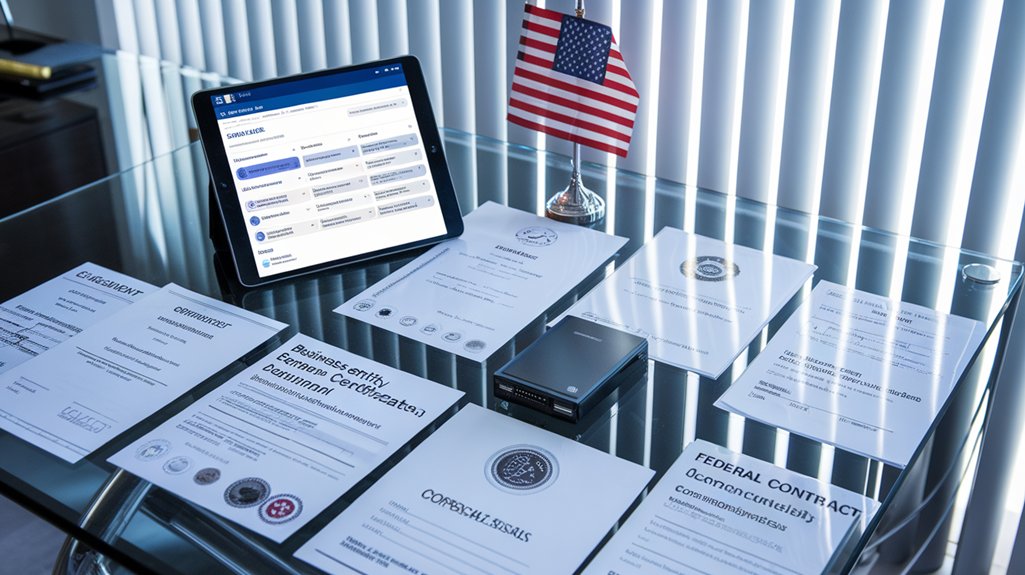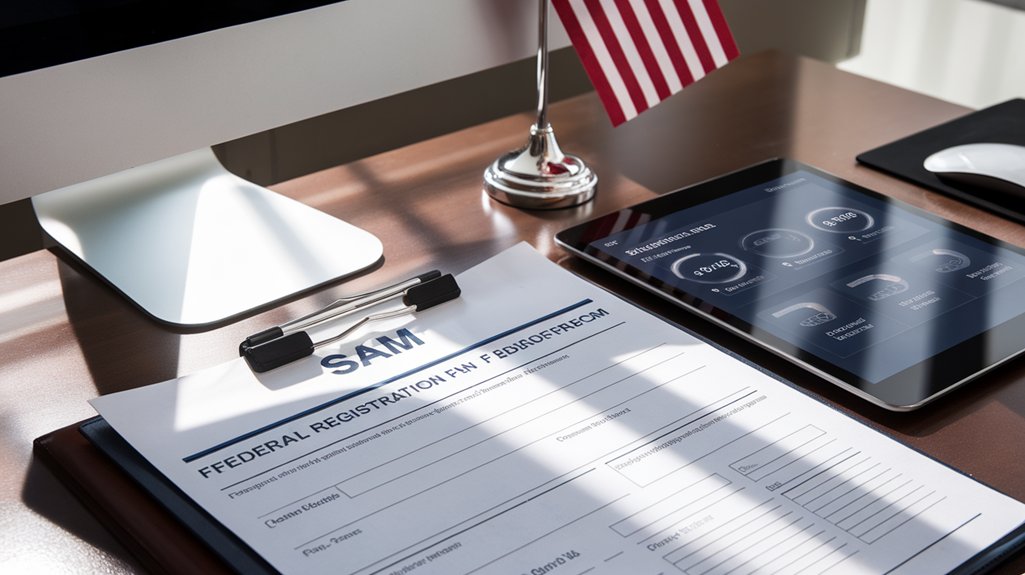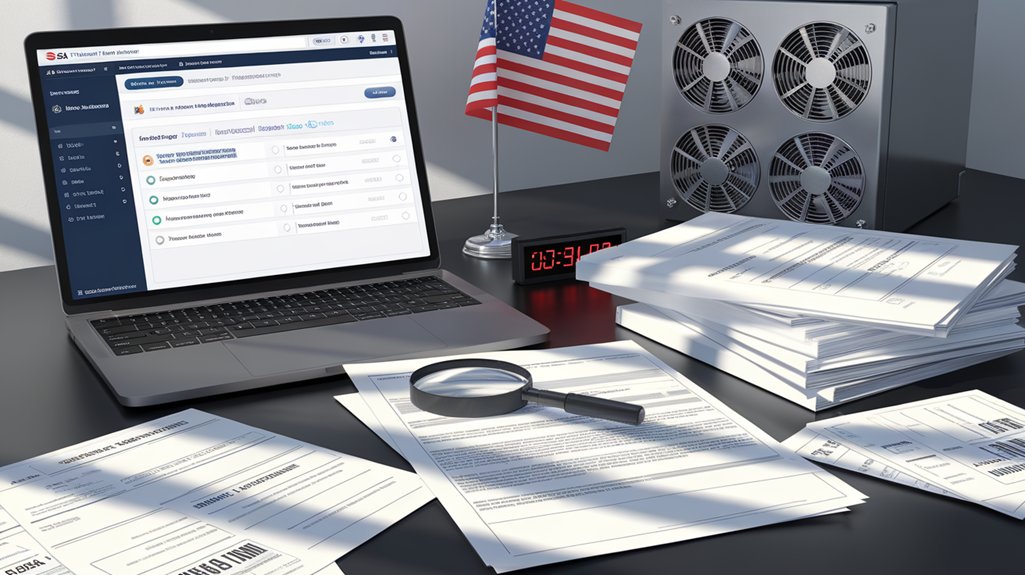Entities required to register in SAM include government contractors, nonprofits seeking federal grants, foreign businesses with U.S. contracts, and state/local governments pursuing federal opportunities. Registration necessitates obtaining a Unique Entity ID, providing legal business details, designating points of contact, and completing financial information setup. Annual renewal maintains eligibility, with processing typically taking 7-10 business days. Non-compliance results in contract award delays and potential suspension from federal opportunities. The following guide offers step-by-step instructions for successful registration.
Essential SAM Registration Requirements by Entity Type

Organizations seeking to do business with the federal government must navigate specific registration requirements based on their entity type.
Government contractors must secure a Unique Entity ID (formerly DUNS Number) and maintain active registration before bidding on federal contracts. The entity classification—whether LLC, corporation, or sole proprietorship—determines specific documentation requirements.
For nonprofit organizations, 501(c)(3) validation through IRS documentation is mandatory, along with executive compensation reporting when applicable.
Foreign entities require an NCAGE code instead of a CAGE code and must complete international address verification.
State and local governments follow different protocols, with certain governmental subdivisions historically exempt from DUNS requirements. These entities must select the appropriate government entity type and manage entity hierarchies for their departments.
Grant applicants across all entity types must complete TIN validation and grants-specific declarations during the registration process.
All entities must create a login.gov account before beginning the SAM registration process to ensure secure access to the system.
Steps to Establish and Maintain SAM Registration Status

Maneuvering through the SAM registration process requires careful attention to eligibility requirements and documentation preparation. Entities must first create a SAM.gov account using Login.gov credentials before selecting their appropriate entity type and providing their legal business name.
The process continues with entering financial details, including EIN and banking information for Electronic Funds Transfer. Annual renewal of SAM registration is required to maintain eligibility for federal opportunities. Registration completion requires designating two points of contact—Electronic Business POC and Government Business POC—followed by submitting representations and certifications. A Unique Entity Identifier is assigned by the government during registration and is required for all contract bids and grant applications.
After submission, processing typically takes 7-10 business days, with accounts becoming active 24 hours after approval.
The latest system updates have streamlined the registration procedure to enhance user efficiency when navigating federal requirements.
For ongoing compliance, entities must implement regular maintenance updates. These include annual renewals to prevent eligibility lapses, updates to entity validation if legal information changes, revisions to NAICS codes when expanding services, and timely POC updates when personnel changes occur.
Benefits and Consequences of SAM Registration Compliance

While traversing the federal marketplace, businesses must understand both the advantages and potential pitfalls of SAM registration compliance. The registration advantages are substantial, including access to federal contracts, increased eligibility for government grants, and enhanced visibility in the procurement ecosystem.
SAM registration opens doors to federal contracts, grants, and heightened visibility in government procurement channels.
Companies maintaining active SAM status experience streamlined contracting processes and improved opportunities for business growth through competitive bidding. The registration process is user-friendly, with clear guidance through each step to ensure successful completion. Businesses of all sizes, from small enterprises to large corporations, can leverage these benefits when properly registered. Registration also ensures regulatory compliance, preventing potential legal issues that could damage business relationships with government agencies.
However, compliance repercussions can be severe for non-compliant entities. Businesses failing to maintain accurate registration data or missing annual renewals may face temporary suspension from federal opportunities, delayed contract awards, and diminished marketplace credibility.
The consequences extend beyond immediate financial impacts to include long-term reputation damage and missed growth opportunities. For organizations seeking government funding, maintaining SAM compliance is not optional but essential for continued eligibility and success.
Frequently Asked Questions
How Long Does SAM Registration Typically Remain Active?
SAM registration typically remains active for 365 days from the initial submission date.
The renewal process must be initiated manually before the expiration date, as automatic renewal is not available.
Businesses should begin the renewal process approximately two months before expiration to maintain a continuous active status.
This proactive approach helps avoid disruptions in eligibility for federal contracts and grants while also preventing potential complications from system delays or processing errors.
Can Foreign Businesses Register in SAM?
Yes, foreign businesses can register in SAM. The foreign eligibility requirements include obtaining an NCAGE code before starting the SAM registration process.
Foreign entities must guarantee that their business name and address match exactly across all registration systems. The registration process requires foreign businesses to obtain a Unique Entity ID (UEI), which replaced the D-U-N-S number in 2022.
Non-U.S. companies must maintain compliance with all documentation requirements and renew their registration annually.
Is SAM Registration Transferable During Business Ownership Changes?
SAM registrations are not directly transferable during business ownership changes. The business ownership transfer process requires specific documentation and compliance steps.
When ownership changes occur, entities must complete novation or change-of-name agreements per FAR 42.12 requirements. The original registration cannot simply be transferred to another entity without proper documentation.
Businesses must provide written notification to contracting officers at least one business day before updating SAM, and failure to follow the registration transfer process may result in payment suspension.
What Information Is Publicly Visible in SAM Registrations?
SAM registrations make several types of public information visible to anyone searching the database.
Public registration details include the legal business name, DUNS/UEI number, business address, entity type, and socioeconomic certifications.
Additionally, exclusion records, active suspension status, FAPIIS entries after a 14-day period, and participation in programs like the Disaster Response Registry are publicly viewable.
However, sensitive information such as banking details and individual taxpayer information remains protected from public access.
Are There Exemptions for Small Businesses From SAM Registration?
No blanket small business exemptions exist for SAM registration requirements.
All businesses, regardless of size, must register in SAM to compete for federal contracts. Size standards only determine eligibility for set-aside contracts, not registration obligations.
The few exceptions apply to specific situations: subcontractors not paid directly by the government and individuals not pursuing contracts.
Even businesses participating in specialized SBA programs (8(a), HUBZone, WOSB) must maintain active SAM registrations to receive federal awards.
📞 Work With the Leading SAM.gov Experts Today
If your organization needs to stay eligible for federal funds, don’t take chances. Work with the professionals trusted by thousands nationwide.
Don’t risk your next contract. Partner with the most experienced SAM registration team in the country.
Take the First Step by Clicking Below:
https://federalprocessingregistry.com/register-online/
18,000+ Registrations Completed
Check Out our 900+ and growing Google 5-Star Reviews
📍 www.federalprocessingregistry.com
📞 Call: (888) 618-0617